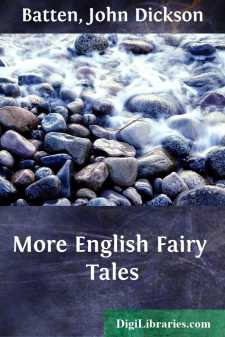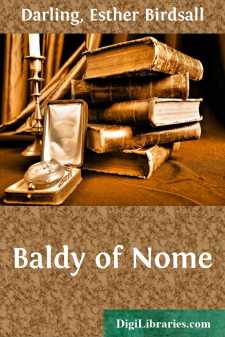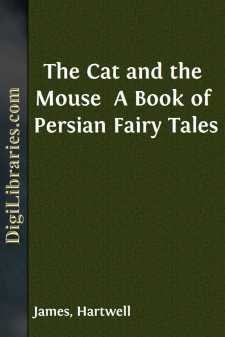Fiction
- Action & Adventure 180
- Biographical 15
- Christian 59
- Classics 6965
- Coming of Age 5
- Contemporary Women 3
- Erotica 8
- Espionage/Intrigue 12
- Fairy Tales, Folklore & Mythology
- Family Life 169
- Fantasy 117
- Gay 1
- General 596
- Ghost 32
- Historical 808
- Horror 43
- Humorous 160
- Jewish 25
- Legal 4
- Medical 22
- Mystery & Detective 315
- Political 49
- Psychological 41
- Religious 64
- Romance 159
- Sagas 11
- Science Fiction 730
- Sea Stories 113
- Short Stories (single author) 537
- Sports 10
- Suspense 1
- Technological 8
- Thrillers 2
- Urban Life 31
- Visionary & Metaphysical 1
- War & Military 173
- Westerns 199
Fairy Tales, Folklore & Mythology Books
Sort by:
by:
Hartwell James
Every boy and girl—and for that matter every man and woman, too—rejoices when the winter snows have vanished and the earth once more puts on her beautiful dress of green, for then the flowers wake from their sleep and clothe the earth with beauty. Because all boys and girls love flowers, those of them who read this book will be interested in the beautiful stories they have to tell, loving them even...
more...
by:
Joseph Jacobs
PREFACE From the extreme West of the Indo-European world, we go this year to the extreme East. From the soft rain and green turf of Gaeldom, we seek the garish sun and arid soil of the Hindoo. In the Land of Ire, the belief in fairies, gnomes, ogres and monsters is all but dead; in the Land of Ind it still flourishes in all the vigour of animism. Soils and national characters differ; but fairy tales...
more...
The Pied Piper Newtown, or Franchville, as 't was called of old, is a sleepy little town, as you all may know, upon the Solent shore. Sleepy as it is now, it was once noisy enough, and what made the noise was—rats. The place was so infested with them as to be scarce worth living in. There wasn't a barn or a corn-rick, a store-room or a cupboard, but they ate their way into it. Not a cheese...
more...
by:
R. Eivind
PREFACE THE following stories cover almost all of the songs of the Kalevala, the epic of the Finnish people. They will lead the English child into a new region in the fairy world, yet one where he will recognise many an old friend in a new form. The very fact that they do open up a new portion of the world of the marvellous, will, it is hoped, render them all the more acceptable, and perhaps, when the...
more...
by:
Gustave Dore
INTRODUCTION What virtues do these stories possess that have kept them alive for so long a time? They have to some degree stimulated and nourished qualities of supreme worth in individual and social life. With the young the struggle against greed and falsehood and pride and cowardice is a very real one, and situations in which these homely, fundamental traits are involved are full of interest and...
more...
CHAPTER I THE PARTING OF THE WAYS Baldy knew that something was wrong. His most diverting efforts had failed to gain the usual reward of a caress, or at least a word of understanding; and so, dog-like to express his sympathy, he came close beside his friend and licked his hand. Always, before, this had called attention to the fact that Baldy was ready to share any trouble with the boy—but to-day the...
more...
by:
Hartwell James
Persia is rich in folk lore. For hundreds and hundreds of years the stories in this book, and many others as well, have been told to the wondering boys and girls of that country, who, as they hear them, picture their native land as one of roses and tulips, where beautiful fairies build their castles in the rosy morn, and black gnomes fly around in the darkness of midnight. A land, too, where the sun...
more...
THE TRAVELS OF TWO FROGS. FORTY miles apart, as the cranes fly, stand the great cities of Ozaka and Kioto. The one is the city of canals and bridges. Its streets are full of bustling trade, and its waterways are ever alive with gondolas, shooting hither and thither like the wooden shuttles in a loom. The other is the sacred city of the Mikado's empire, girdled with green hills and a nine-fold...
more...
by:
Unknown
BEAUTY AND THE BEAST. There was once a merchant who had been very rich at one time, but who, having had heavy losses, was compelled to retire to a little cottage in the country; where he lived with his three daughters. The two elder ones were very much discontented at their poverty, and were always grumbling and making complaints. But the youngest one, who was called Beauty, and who was as amiable as...
more...
I WONDER!I wonder if in SamarcandGrave camels kneel in golden sand,Still lading bales of magic spellsAnd charms a lover's wisdom tells,To fare across the desert mainAnd bring the Princess home again—I wonder!I wonder in Japan to-dayIf grateful beasts find out the wayTo those who succoured them in pain,And bring their blessings back again;If cranes and sparrows take the shapeAnd all the ways of...
more...











